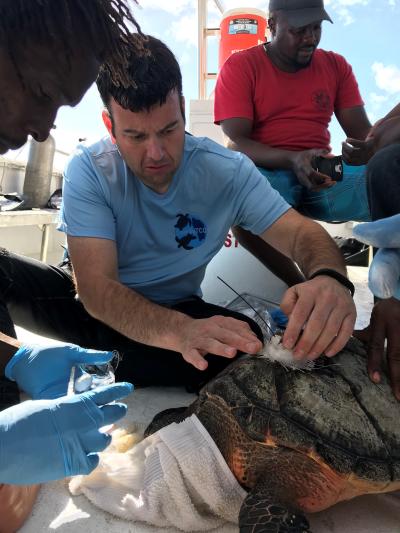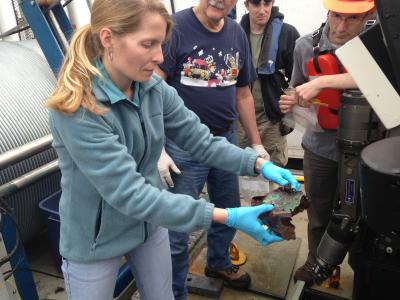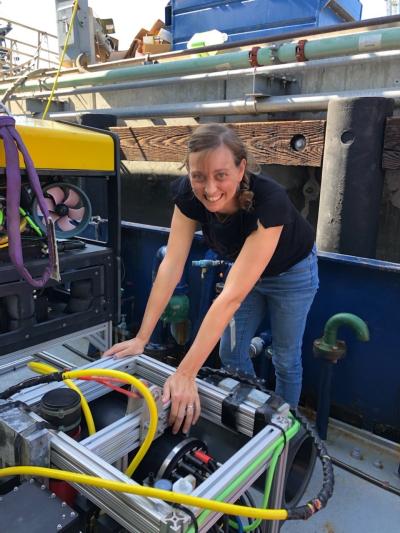Innovative program has provided important scientific data to inform bureau's decisions for 50 years.
By Dr. Rodney E. Cluck
Chief, Division of Environmental Sciences, Environmental Studies Program
Office of Environmental Programs, BOEM
Natural resource development cannot be done well without a strong scientific foundation.
Since its inception in 1973, the Bureau of Ocean Energy Management’s (BOEM) Environmental Studies Program (ESP) has provided valuable information to predict, assess, and manage impacts from offshore energy and marine mineral exploration, development, and production activities on human, marine, and coastal environments. This year marks ESP’s 50th anniversary and we could not be more pleased with the trajectory of our program.
Realizing Ocean Stewardship Through Science
The vision of BOEM’s ESP is to realize ocean stewardship through science. This approach complements BOEM’s mission of managing development of U.S. Outer Continental Shelf (OCS) energy and mineral resources in an environmentally and economically responsible way. The ESP also seeks to align the program with the broader stewardship role the Department of the Interior (DOI) plays in managing the Nation’s public lands—the federal government and ocean users working cooperatively with mutual respect to achieve shared natural resource management goals.
To accomplish this, the ESP asks three key questions:
- What does BOEM need to know?
- What strategic questions should be posed?
- What criteria should be used to prioritize studies for addressing these questions?
The ESP develops, funds, and manages rigorous scientific research specifically to inform policy decisions on the development of energy and mineral resources on the OCS. ESP science staff from BOEM’s offices and regions collaborate with BOEM’s regional and program leadership to formulate study topics, issues, and information needs based on the information decisionmakers require for responsible offshore energy and mineral resources management. The Program has provided over $1.25 billion for research since its inception.
Two points are worth bearing in mind before delving further into the issues. First, political winds change frequently, and the bureau’s priorities at the end of this decade may look very different from what is deemed important in 2023. As a result, ESP must be nimble and able to quickly pivot as new issues and priorities emerge. This flexibility has been a hallmark of the program since its creation. For ESP to remain successful, it will be vital to be proactive in maintaining ESP’s ability to provide science-based answers to key questions of the day.
Second, ESP is an applied science program. Unlike other federal agencies that undertake basic research, BOEM is solely a resource management agency and uses the information ESP generates for managing OCS energy and mineral resources. Studies are only approved when there is a clear need. Historically, this criteria has restricted the geographic focus of ESP research to areas with either active or planned offshore energy and mineral development, making it challenging for ESP to collect vital baseline information in areas where there is no current activity. Moving forward, the bureau would be well served to identify potential areas of interest and thereby allow ESP to better position itself to provide the information that will be needed in the coming years.
Who is ESP?
The ESP develops, conducts, and oversees world-class scientific research, making it the bureau’s indispensable tool to produce science for informed decisions. But the most important resource in the ESP is its staff. The Program has more than 200 environmental scientists in all offices and regions, covering a broad range of disciplines, including physical, chemical, and biological oceanography, atmospheric sciences, marine biology, protected species, benthic ecology, archeology, social science, economics, and environmental science.
Annually, BOEM solicits study ideas from staff and stakeholders from across the country to consider a broad array of specific science needs. Though ESP cannot fund all suggested study ideas, the selection process is transparent and allows for engagement across the bureau and the nation.
Why ESP Works
The ESP is small compared to other federal science programs, and the Program has been designed to harness the benefits of this size. Unlike many other federal research programs, ESP scientists rely upon collaborative relationships with academic institutions, other federal agencies, the private sector, developers, philanthropic groups, Tribes, and local entities (such as port directors and community members) to leverage their outside expertise and resources (e.g., research vessels, aircraft, satellites) for study efforts. Our design allows us to initiate studies quickly without having to build additional in-house expertise or physical infrastructure. As new challenges arise, we can easily pivot and work with preeminent scientists to help collect data and analyze the information to inform decisions. By investing our financial resources solely in science contracts and agreements for decision-making, ESP keeps costs low for the taxpayer and serves as a model for good government and fiscal responsibility.
Drivers and Challenges
For decades, oil and gas development has been ESP’s biggest driver of studies efforts, and much research remains to be done in the oil and gas sector. Now, however, BOEM must consider multiple scientific priorities for information decisions, and current global trends portend a shift away from fossil fuel investments and towards a broader adoption of renewable energy technologies, especially offshore wind. Moving forward, much of ESP’s research focus will be on renewable energy.
Other scientific priorities include marine mineral resources and carbon sequestration. Already, BOEM has received more requests for marine mineral leases than in the past, and – with a projected increase in the intensity of coastal storms – this trend is likely to continue. Consequently, the bureau expects rising demand for research on OCS sand and gravel resources.
In addition, the Inflation Reduction Act expanded BOEM’s geographic scope to include the territories of Puerto Rico, US Virgin Islands, Guam, Northern Mariana, and American Samoa. ESP’s nimble nature allows us to make these adjustments and conduct needed science to inform program decisions easily and without interruption.
BOEM also faces several challenges. Some – such as decommissioning of oil and gas infrastructure and science needs for offshore wind development – will stem directly from the industry drivers mentioned above. Others – such as finding effective ways to manage large amounts of data or dealing with the impacts of climate change – are broader and not tied to specific industry drivers.
In the coming years, many scientific priorities will stem from the nation’s need to respond to a warming world. Climate change will significantly impact BOEM’s work. To adequately prepare for a more uncertain environment, ESP will need to view future scientific efforts through a climate change lens. To carry out its mission effectively, BOEM will rely on ESP to generate the scientific information needed to address and manage these issues.
Science is fundamental to BOEM’s decision-making process. Natural resource development cannot be done well without a strong scientific foundation. BOEM’s ESP allows the bureau to take a forward look to identify information needed for future impact assessments and environmental compliance.
For 50 years, ESP has provided BOEM’s leadership with objective unbiased science for informed decision-making. ESP looks forward to continuing this tradition for the next 50 years.
-- BOEM --
The Department of the Interior’s Bureau of Ocean Energy Management (BOEM) is responsible for America’s offshore energy and mineral resources. The bureau promotes energy independence, environmental protection and economic development through responsible, science-based management of energy and mineral resources on the U.S. Outer Continental Shelf.





